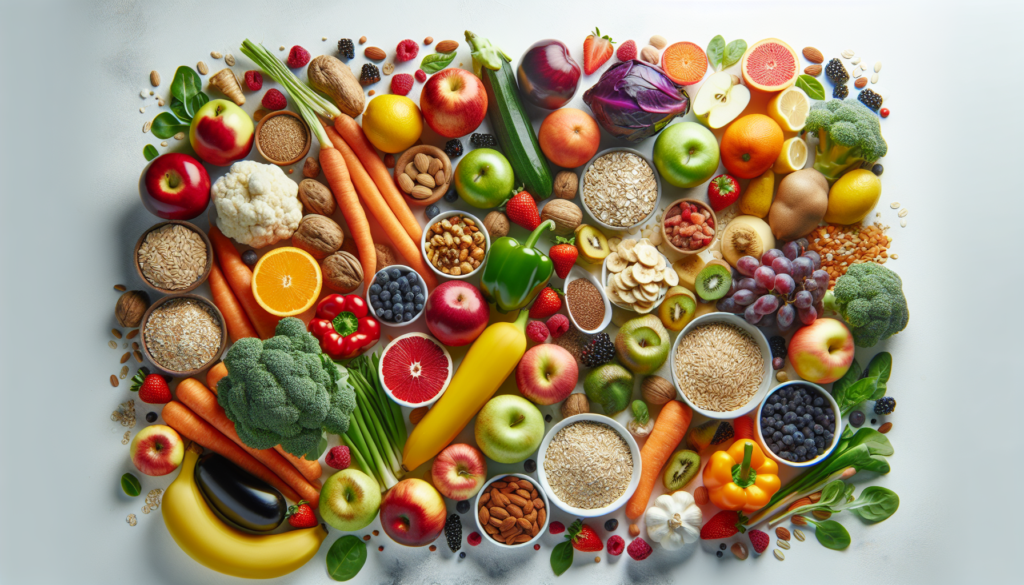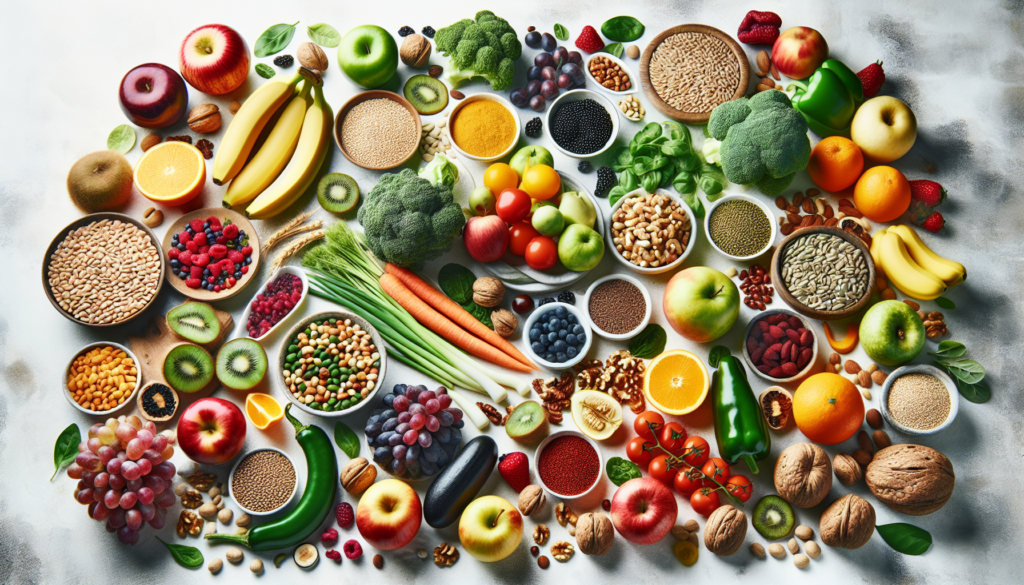Have you ever gazed into your fridge, past the limp lettuce and the questionable yogurt, and asked yourself, “What’s all the fuss about whole foods, anyway?” Well, strap yourself in and get ready for a nutritional joyride that rivals any kaleidoscope of curiosity you’ll encounter on the food pyramid highway. We’re about to embark on a culinary journey through the land of whole foods, where grains, fruits, and vegetables parade proudly, unprocessed and as nature intended—assuming nature was in the business of producing commercially viable snacks, of course. So, while you’re defending your fort of fortified cereals, let’s discover together why eating whole foods might just be the ticket to a healthier you.

What Exactly Are Whole Foods?
Before you can appreciate something, like opera or your grandmother’s secret casserole recipe, understanding it is half the battle. Whole foods, in their simplest form, are foods that are closest to their natural state. They are unprocessed and unrefined—or processed as minimally as possible. Picture a carrot with slightly less of an existential crisis. Whole foods include fresh fruits, vegetables, whole grains, nuts, seeds, legumes, and the aptly named “whole” eggs.
The Unprocessed Gospel
Think of whole foods as the classic rock of the food world—timeless and authentic. They aren’t overproduced or artificially enhanced with external nonsense. They’re the Rolling Stones of the produce aisle, with less Jagger but just as much swagger. Eating whole foods means you’re getting all the natural nutrients they offer—a smorgasbord of vitamins, minerals, fiber, and phytochemicals, without the accessory laden robes of added sugars or sodium.
The Nutritional Advantages of Whole Foods
So why should these naturally-born fairest of them all be the apple of your eye? Hoist your forks high as we plunge into the nutritional benefits that these delightful edibles offer.
A Cornucopia of Nutrients
First up to bat—nutrients. Whole foods are absolutely jam-packed with them, more densely packed, in fact, than your cousin’s suitcase on a week-long trip. Whole foods bring to the table the essential life-giving nutrients that our bodies need, like vitamins A, C, D—think of them like the superheroes of nutrition.
Vitamins and Minerals
If you were to appoint an Avengers lineup of the vitamin world, you’d find whole foods on the frontlines. Fruits and vegetables, particularly in their whole form, are teeming with vitamins and minerals indispensable for our everyday health. Oranges, for instance, are more than just a spherical source of sweetness; they’re delicious little packages full of vitamin C, potassium, and folate.
Fiber: The Unsung Hero
Fiber is akin to that unsung hero working backstage in a blockbuster movie. It doesn’t grab the spotlight, but where would you be without it? Likely miserable, and possibly spending more time than desired on your smartphone in the loo. Whole foods offer insoluble and soluble fiber, helping everything from weight management to gallantly regulating your digestive kingdom. Pass the quinoa, please.
The Battle Against Chronic Diseases
In the boxing ring between your body and chronic diseases, whole foods are the ideal tag-team partner, with a winning record against the heavyweight champs of heart disease, diabetes, and obesity. Studies suggest that diets rich in whole foods may reduce the risk of these chronic diseases—consider them the wellness guard dogs of your pantry.
High in Antioxidants
Imagine antioxidants as tiny knights galloping through the corridors of your bloodstream on their noble steeds, warding off the dastardly free radicals that try to cause cellular mayhem. Whole foods, like berries and nuts, are chock-full of these mighty protectors, who work tirelessly to reduce oxidative stress and inflammation. An apple a day might not only keep the doctor away but perhaps some pesky free radicals too.
Incorporating Whole Foods Into Your Diet
Alright, you’re sold on the benefits. But what about the “how” part of the equation? Incorporating whole foods into your daily routine needn’t be more taxing than finding matching socks on laundry day—it might even turn out to be a delightful experience.
Start Small, Think Big
Transitioning to a whole foods diet doesn’t have to be a Herculean feat. Start small with a few substitutions. Swap out processed snacks for fresh fruit or opt for whole grain alternatives over their refined cousins. Spoiler alert: whole wheat bread won’t bite any harder than white bread.
Spice Things Up
Mother Nature has been generous enough to bestride upon us a treasure trove of herbs and spices. Use them to zhuzh up whole foods, because let’s face it, there’s only so many ways you can tell yourself that plain broccoli is scrumptious without invoking Pinocchio-level nose growth.
Embrace Variety
Keep meals varied and exciting. Try your hand at a culinary dungeon crawl through the world’s root vegetables, or host a legume-themed potluck. The options are endless, and your taste buds will surely send you a thank-you card.
The Role of Whole Grains
If whole foods are the superheroes of dietary choices, whole grains are the caped crusaders. Quinoa, bulgur, barley—these aren’t just the names on artisan soap tags but grains that can elevate your kitchen cred and turn mundane meals into something approaching gourmet without the use of a foam reduction.
Dispelling Whole Food Myths
Like any popular item, whole foods come with their fair share of myths. Let’s smash through these misconceptions with the vigor of a clown at a pie-throwing contest.
Myth: Whole Foods Are Boring
Some folks think eating whole foods is akin to chewing on cardboard. Spoiler: they’re wrong. With the variety of textures, flavors, and combinations at our disposal, boredom wouldn’t dare set foot in your kitchen. Plus, wasn’t it Jane Austen who said, “A well-composed salad is a true work of art”? Ok, we might have made that up, but don’t let facts get in the way of a good salad.
Myth: They Cost More
Concerns about costs might cause some trepidation. While it’s true that certain organic options are priced like collector’s items, many fruits, vegetables, and grains remain affordable alternatives. Plus, considering their potential health benefits, they might save you money in the long run. Fewer trips to the doctor mean more money for important things like artisanal cheeses.
Myth: Preparation Is Time-Consuming
Yes, washing spinach or slicing sweet potatoes takes longer than ripping open a packet of powdered soup. But think of it as self-care in disguise—like a nutritional face mask for your digestive system. Embrace the process, and soon you’ll be the zen master of meal prep.

Busting Out of Your Nutritional Rut
Consider this your virtual invitation to don your finest apron and step up your food game. Explore the palette of colors and flavors available at your nearest produce aisle, because once you go whole, you never roll (your eyes at your dinner plate) again.
Final Thoughts on Whole Foods
Eating whole foods can become one of your life’s simpler pleasures. It’s a chance to connect with the earth and its bounty in a way that pre-packaged grub just doesn’t offer. More than mere sustenance, consider it an ode to simplicity, flavor, and the art of wondering just what thrives in that long-neglected corner of your garden.
Bring in the Yum
At the end of the day, your kitchen is your canvas. Whole foods are your paints, your magic ingredients. Cooking with whole foods is less about deprivation and more about embracing the kaleidoscope of options available—from crimson bell peppers to roasted butternut squash, from creamy avocados to tangy grilled pineapple. Your life will become the culinary adventure it was destined to be, one whole bite at a time.
So go ahead, challenge yourself! Put on that chef’s hat, grab an array of nature’s finest, and may your taste buds thank you profusely. If all else fails, there’s always a witty article (or a questionable yogurt) waiting to entertain you next time you peek into the fridge.
